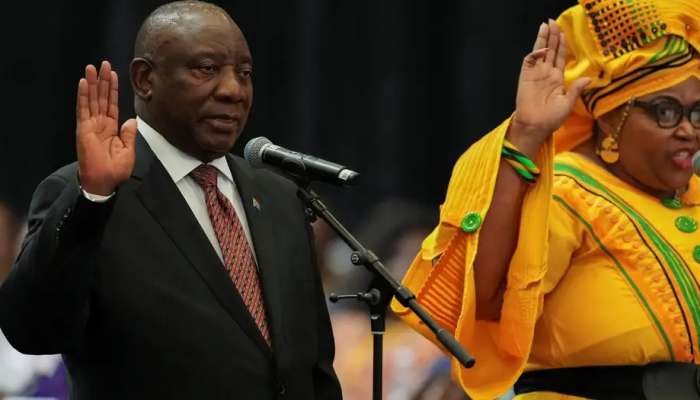
Cape Town: South Africa's largest political party, the African National Congress (ANC), has reached a deal to form a unity government with former political foes the Democratic Alliance (DA).
DA Leader John Steenhuisen said today would "go down in the annals of history as the start of a new chapter" for South Africa.
"It is my privilege to report to you that after two weeks of thorough negotiations that only concluded after today's sitting of parliament had already started, the DA has reached agreement on the statement of intent for the formation of a Government of National Unity."
Earlier South African media reported that a deal had been struck involving the opposition Democratic Alliance and the Inkatha Freedom Party (IFP).
Talks on forming a coalition government had gone down to the wire with the ANC having to form a governing alliance after losing its parliamentary majority in elections held over two weeks ago.
The ANC won 159 out of 400 seats in the National Assembly. The opposition DA was next with 87 seats, while the populist uMkhonto we Sizwe (MK) party, led by former President Jacob Zuma, with 58.
The move comes as South Africa's newly elected parliament holds its first sitting on Friday during which President Cyril Ramaphosa is expected to be reelected.
DW correspondent Dianne Hawker has been tracking developments in Cape Town and said the government of national unity was the "big buzzword for today."
"We understand that the ANC and the Democratic Alliance will form the core of that government of national unity," Hawker said.
"The Democratic Alliance is second largest party in this parliament and has been a longstanding opposition party to the ANC. In fact during the election campaign period they were campaigning to save South Africa from the ANC. But they've put those election fights behind them and seemingly now have found a way to move forward with the leaders of the ANC," Hawker explained.
According to ANC Secretary-General Fikile Mbalula, talks about a government of national unity were held with opposition parties.
The DA, the Zulu nationalist Inkatha Freedom Party (IFP) and several smaller parties all backed a government of national unity (GNU).
Mbalula said the radical leftist Economic Freedom Fighters (EFF) had refused to join what he still called a unity government.
"We have engaged in exploratory discussions with the EFF, and we did not find each other on the issue of the GNU," Mbalula told reporters. "We have engaged with the DA, we agreed on the GNU with them."
Mbalula said the ANC would continue to engage with the MK party, which has disputed the May 29 election results.
Zuma's party has warned it would boycott Friday's proceedings.
The leaders of the MK and EFF were former members of the ANC, with Julius Malema being at one point the ANC Youth League president before he was thrown out of the party, and Zuma having been ANC leader for 10 years.
The first sitting of parliament is being held in the Cape Town International Convention Center situated just under 2 kilometers from the parliamentary building, which is undergoing extensive renovations after being severely damaged in a fire in January 2022.
Members have been sworn and have taken their oaths of office, overseen by the country's Chief Justice Raymond Zondo.
Shortly before the process to elect a speaker and deputy speaker of parliament was to take place, EFF Deputy President Floyd Shivambu requested a 30-minute break "to consolidate their position."
Appearing to meet the EFF halfway, Justice Zondo said he would allow a 15-minute comfort break.
That process will be followed by the election of the president.
Ramaphosa is expected to win a secret ballot of lawmakers in a process that confirms his reelection.
That would then be followed by the swearing-in of the president in an inauguration that will take place in Pretoria with a tentative date of June 19.
The president will then unveil his new cabinet of ministers which will include members of his own party and parties in the coalition.